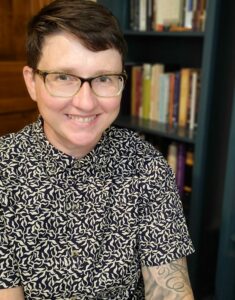
Healing Haunted Histories: A Case Study in Native, Settler, and Queer America
A Course created by Rev. Eileen Gebbie
This course, developed by Rev. Eileen Gebbie, uses Elaine Enns’s and Ched Myers’s Healing Haunted Histories: A Settler Discipleship of Decolonization, to explore what it might mean for non-Indigenous people (“re-settlers”) to now live on colonized, wounded land.
In 1838 the United States government forcibly moved all of the Indigenous Potawatomi people then living in Indiana to Kansas. Their “Trail of Death” through Illinois intersected with what is currently a park, donated to the University of Illinois in 1946 by Robert Allerton—a Mayflower descendent, philanthropist, and (closeted gay) heir to stockyard and land fortunes. Adjacent to the trail and within the park grounds are cemeteries for White colonists whose time there overlapped with the time of the trail and who were left interred by Allerton. The course uses this history as the starting point from which to explore local histories of indigenous removal, colonialism, and relationship.
This resource offers a course guide outline for those wishing to use the course in a group setting as well as PowerPoint slides to accompany each session. The course is structured as six 90-minute sessions which include questions for reflection on a wide range of topics, including theologically-grounded questions for faith communities.
 Meet Eileen Gebbie
Meet Eileen Gebbie
Eileen is living and working at the intersections of antiracism, queerness, climate change, and faith in Champaign County, Illinois. Eileen was the the first female and first queer senior pastor at two congregations in the United Church of Christ (a non-creedal Christian denomination pushing the boundaries of radical inclusion). Eileen now serves creation as a spiritual director, forest therapy guide, and as a contemplative practitioner for youth and young adults in an intensive outpatient mental health treatment program.

